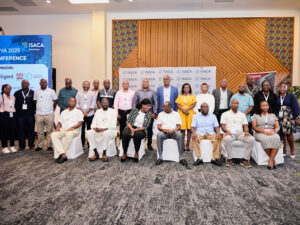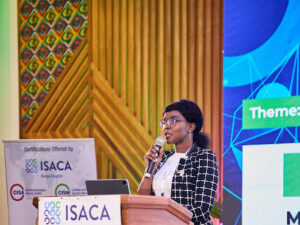By Nuru Salim and Alloys Musyoka
The National Government has reaffirmed its commitment to embracing emerging technologies to enhance public service delivery, boost economic growth, and protect the country from rising cybersecurity threats.
Speaking during the official opening of the ISACA Kenya Chapter 2025 Annual Conference in Mombasa, Head of Public Service and Chief of Staff at State House, Felix Koskei, said that President William Ruto’s administration has placed technology at the core of its development agenda.
He noted that digital transformation is being leveraged to modernize key sectors such as agriculture, healthcare, education, and housing.
“The government is committed to fostering a digital-first approach across all sectors. We are embracing innovation to improve the lives of citizens, while putting in place safeguards to protect against cybercrime and data breaches,” said Koskei.
He said that over 22,000 government services have now been digitized, with investments in fiber optic infrastructure connecting thousands of public institutions and enabling service access even in remote areas. Additionally, more than 200 digital hubs are already operational, offering access to digital resources, training, and public services.
Koskei emphasized that the government is targeting to grow the digital economy’s contribution to the national GDP significantly by 2032. To achieve this, he urged IT professionals to step forward and actively participate in shaping digital policies and providing technical oversight within government systems.
“We cannot afford to be passive. IT professionals must claim their space in policy development and ensure digital systems are structured, protected, and efficient. Technology is not only about access, it’s about accountability, security, and sustainability,” he added.
The five-day conference, hosted at PrideInn Paradise Beach Resort brought together over 400 technology professionals, industry leaders and senior executives across Africa all aligned in shaping the digital world in Kenya under the theme “Anticipating and Leveraging Disruptive Innovations.”
The platform is designed to foster dialogue on navigating rapid technological changes while ensuring responsible and inclusive adoption of digital tools.
The event brought together over 400 technology professionals, industry leaders and senior executives across Africa all aligned in shaping the digital world in Kenya.
ISACA Kenya Chapter President Mercy Omollo emphasized the need to invest in capacity building to ensure Kenya remains competitive in the global digital space. She said ISACA, a global association of technology professionals, is working closely with the government to provide specialized training and policy input, particularly in areas like data protection, artificial intelligence, and cybersecurity.
“We are actively contributing to national discussions on emerging technologies and reforms to the Data Protection Act. ISACA is committed to equipping both professionals and students with practical skills to help secure and drive the digital economy,” Omollo said.
She added that ISACA has initiated outreach programs to train university students and emerging professionals, ensuring they are equipped with industry-recognized certifications and relevant digital skills.
“Technology is evolving rapidly. It’s no longer about resisting disruption, it’s about working together with it to enhance technology. AI, for example, should be viewed not as a threat, but as a partner that can enhance how we work. However, we must also ensure strong governance to prevent misuse,” she noted.
Informational Technology and digital economy PS Engineer John Tanui has called on professionals in the IT sector to work with the government in ensuring a better digital and safe space.
He said that Kenya is ranked number one in using social media platforms globally.
“Kenya is very active and fast in adoption, looking in the data in terms of social media usage globally Kenya is ranks uses three hours 43 minutes’ average per day which is number one globally, that is why our social media platforms are hot because we have laid the infrastructure and our young people are adoptive and are keen to explore this digital space,” he said.


